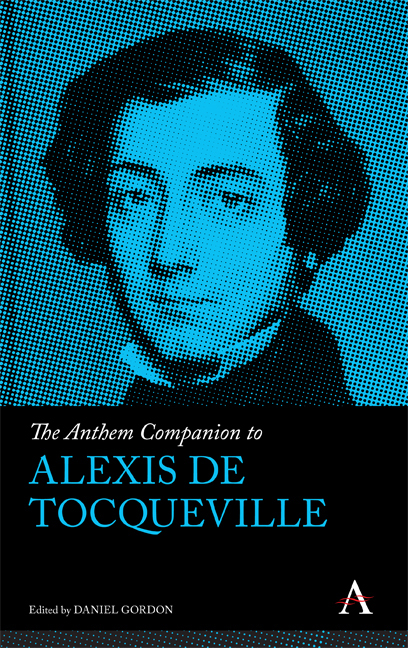Book contents
- Frontmatter
- Contents
- Introduction: Tocqueville and the Sociological Conversation
- A Note on References to Democracy in America
- Part 1 Religion And Immaterial Interests
- Part 2 Language, Literature, and Social Theory
- Part 3 Globalism and Empire
- Chapter 5 Noble Comparisons
- Chapter 6 Tocqueville and Lévi-Strauss: Democratic Revolution at Bookends of Empire
- Part 4 Inequalities Inside Democracy
- Part 5 Citizenship, Participation, and Punishment
- Part 6 An Unfinished Project
- Notes on Contributors
- Index
Chapter 5 - Noble Comparisons
from Part 3 - Globalism and Empire
Published online by Cambridge University Press: 12 July 2019
- Frontmatter
- Contents
- Introduction: Tocqueville and the Sociological Conversation
- A Note on References to Democracy in America
- Part 1 Religion And Immaterial Interests
- Part 2 Language, Literature, and Social Theory
- Part 3 Globalism and Empire
- Chapter 5 Noble Comparisons
- Chapter 6 Tocqueville and Lévi-Strauss: Democratic Revolution at Bookends of Empire
- Part 4 Inequalities Inside Democracy
- Part 5 Citizenship, Participation, and Punishment
- Part 6 An Unfinished Project
- Notes on Contributors
- Index
Summary
A discussion of Tocqueville's work and his lasting contributions must be based on a widening of horizons. Due attention needs to be paid to the work of Tocqueville's friend, traveling companion, and cowriter Gustave de Beaumont. Beaumont accompanied Tocqueville to America and later also to England, Ireland, and Algeria. These travels were paralleled by their joint political ambitions and writing careers, finding expression in common projects such as political, social, and constitutional reform, most of which would have been impossible without comparisons. In most of these ventures Tocqueville and Beaumont saw eye to eye and remained “comrades in arms.” There was, however, also a manifest division of labor between the two, detectable in their respective writings about America, Europe, and beyond. Tocqueville took on what we would call today the horizontal “big picture,” the comparison of emerging democracies on both sides of the Atlantic, while Beaumont argued more “vertically” by looking into the magnifying glass and studying those who had been left behind in the process, that is, Native Americans, African Americans, the impoverished, women, and the victims of colonization, in particular Irishmen and Irishwomen.
Any serious interpretation also needs to pay attention to François Furet's remark that Tocqueville's—and by implication Beaumont's—thought had an existential dimension: how to defend and maintain a nonutilitarian notion of liberty in the light of new, democratic, and egalitarian aspirations and demands (Furet [1985] 2005). This preoccupation was a driving force in almost all their comparisons, especially concerning what I consider to be their three core axes: the comparison between the United States and Europe, between England and Ireland, and between France and Algeria.3 These comparative analyses are here discussed in the order in which Tocqueville and Beaumont encountered and addressed them. In a final reflection I will briefly discuss the potential benefits for the contemporary social scientist of the historical reconstruction of Tocqueville's and Beaumont's pioneering comparisons.
Axis 1: The United States and Europe
Tocqueville's and Beaumont's prime motive to travel to America had always been to find out whether it was possible to have a revolution without the negative backlashes they had witnessed in France, such as the threat of counterrevolution, the reign of terror, or Napoleon's attempt to establish an empire (Tocqueville and Beaumont 2010, 29–30, 49–56, 91–92, 127, 137–38, 140–41).
- Type
- Chapter
- Information
- The Anthem Companion to Alexis de Tocqueville , pp. 91 - 108Publisher: Anthem PressPrint publication year: 2019



